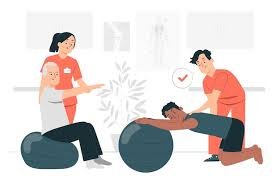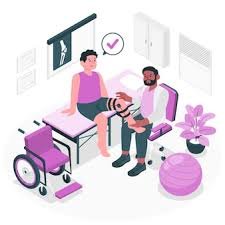Kankarbagh,Patna-800020 Landmark: Near Sri Sai Lions Netralaya
Neurodegenerative Rehab
Neurodegenerative Rehab at Sparc Hospital in Patna
Neurodegenerative diseases have a significant impact on individuals and society, often leading to a decline in cognitive, motor, and functional abilities. These conditions can profoundly affect daily life, limiting independence and impacting the overall quality of life. At Sparc Hospital in Patna, we understand the importance of neurodegenerative rehab in managing and improving the lives of those affected by these conditions. Our approach focuses on providing personalized, holistic care to enhance mobility, cognitive function, and emotional well-being.

What Are Neurodegenerative Diseases?
Neurodegenerative diseases encompass a group of conditions that involve the gradual degeneration of nerve cells, leading to progressive decline in function. Common examples of neurodegenerative conditions include Alzheimer’s disease, Parkinson’s disease, Multiple Sclerosis (MS), and Huntington’s disease. These diseases can result in a range of symptoms, including motor dysfunction, cognitive impairment, and difficulties in performing daily activities. The exact causes of neurodegenerative diseases are complex and multifactorial, involving genetic, environmental, and lifestyle factors.
How Diagnosis and Assessment Is Done?
Early diagnosis is essential for managing neurodegenerative conditions effectively. Timely identification can lead to better treatment outcomes and a more comprehensive care plan. At Sparc Hospital, we utilize advanced diagnostic tools and techniques, including MRI, CT scans, and neuropsychological tests, to assess the extent of the disease and determine the most appropriate rehabilitation approach. Our initial assessment process involves a comprehensive evaluation of the patient’s physical, cognitive, and emotional well-being, ensuring that the treatment plan is tailored to their specific needs.

Our Services for Neurodegenerative Rehab
At Sparc Hospital, we offer a wide range of services tailored to meet the unique needs of each patient. Our team of experienced healthcare professionals, including neurologists, physical therapists, occupational therapists, speech-language pathologists, and psychologists, collaborate to provide a comprehensive, multidisciplinary approach.

Physical Therapy
Physical therapy plays a crucial role in neurodegenerative rehab. Our tailored exercise programs are designed to improve mobility, balance, and strength, addressing symptoms such as muscle stiffness and coordination issues. We use a variety of techniques, including neuromuscular re-education, strengthening exercises, and stretching routines, to enhance physical function and reduce the risk of falls.

Occupational Therapy
Occupational therapy focuses on helping patients adapt to daily living activities to maximize independence. Our therapists work closely with patients to develop strategies for managing fine motor skills, cognitive function, and sensory processing. The goal is to enable individuals to perform daily tasks with minimal assistance, promoting a sense of empowerment and self-reliance.

Speech and Language Therapy
Speech and language therapy is essential for patients experiencing communication and swallowing difficulties. Our therapists employ various techniques to enhance communication skills, including cognitive exercises, language retraining, and speech articulation exercises. Additionally, we offer interventions to address swallowing difficulties, ensuring safe and efficient eating and drinking practices.

Cognitive Rehabilitation
Cognitive rehabilitation aims to improve memory, attention, executive function, and other cognitive skills. Our specialized cognitive exercises and therapies are tailored to the individual’s needs, helping them maintain cognitive function and adapt to the challenges posed by neurodegenerative diseases. These activities include memory training, problem-solving exercises, and cognitive-behavioral techniques.

Nutritional Counseling
Nutrition plays a vital role in overall health and well-being, particularly for individuals with neurodegenerative conditions. Our dietitians provide personalized meal plans that support optimal brain health, manage weight, and prevent complications. We emphasize a balanced diet rich in essential nutrients and antioxidants that can have a positive impact on cognitive function.

Psychological Support
Neurodegenerative diseases can have a significant emotional and psychological impact on patients and their families. Our psychological support services, including counseling and support groups, aim to address anxiety, depression, and other emotional challenges associated with these conditions. By providing a safe space for sharing experiences and coping strategies, we support the overall well-being of our patients.
Facilities and Technology
Sparc Hospital offers state-of-the-art facilities and advanced technology to support comprehensive neurodegenerative rehab. Our modern infrastructure and equipment contribute to a comfortable and supportive environment for patients. We utilize advanced diagnostic tools and therapeutic technologies, such as computerized cognitive assessments and robotic-assisted therapy, to enhance treatment outcomes.
Why Choose Sparc Hospital?
Choosing SPARC Hospital for Spinal Cord Injury (SCI) Treatment offers several compelling reasons:
Experienced and Multidisciplinary Team
Our healthcare professionals have extensive experience in neurodegenerative rehab, ensuring high-quality care.
Personalized and Comprehensive Care Approach
We customize our treatment programs to meet each patient’s specific needs and objectives.
Proven Success in Neurodegenerative Rehab and Patient Satisfaction
Our track record demonstrates successful outcomes and patient satisfaction.
Advanced Facilities and Cutting-Edge Technology
Our modern infrastructure and technology support effective diagnosis and treatment.
Compassionate and Supportive Environment
We prioritize patient comfort and emotional well-being throughout their healthcare journey.
Commitment to Continuous Improvement and Patient Satisfaction
We strive to provide the highest standard of care through ongoing improvement and patient feedback.
FAQs
We treat a range of neurodegenerative conditions, including Alzheimer’s disease, Parkinson’s disease, Multiple Sclerosis, and Huntington’s disease.
Our initial assessment includes comprehensive physical, cognitive, and emotional evaluations using diagnostic tools such as MRI, CT scans, and neuropsychological tests.
Neurodegenerative rehab can improve mobility, cognitive function, and emotional well-being, allowing patients to maintain independence and a higher quality of life.
Psychological support plays a crucial role in addressing the emotional and psychological challenges associated with neurodegenerative conditions, helping patients cope and maintain overall well-being.
